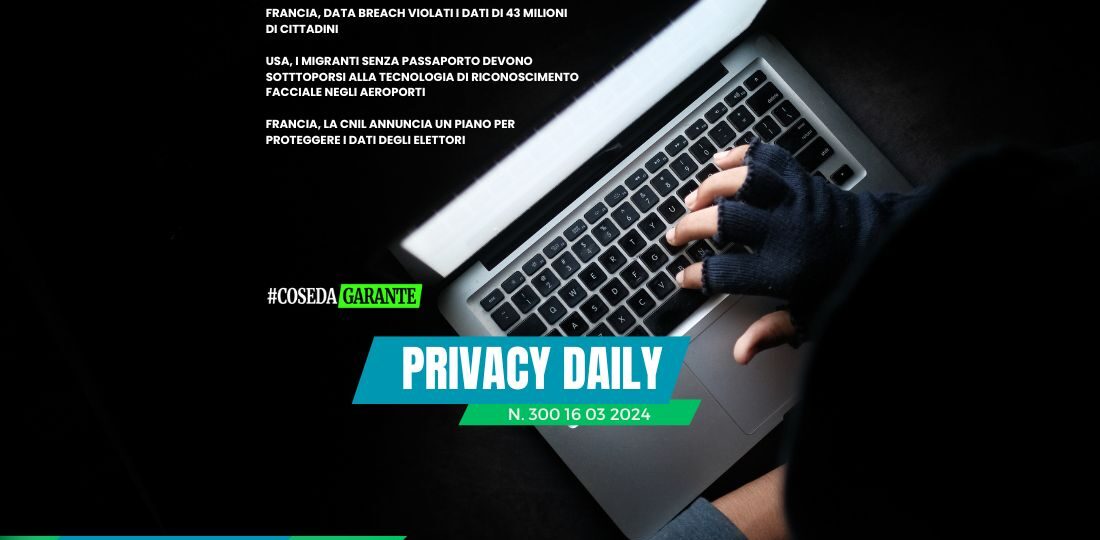VERSIONE ITALIANA
FRANCIA, DATA BREACH VIOLATI I DATI DI 43 MILIONI DI CITTADINI
France Travail ha annunciato lo scorso mercoledì di aver informato l’organo di controllo per la protezione dei dati del Paese – CNIL – di un data breach, risalente a 20 anni fa, che ha interessato il Dipartimento governativo francese responsabile dell’assistenza ai disoccupati e che ha coinvolto circa 43 milioni di cittadini. La dichiarazione del dipartimento rivela che sono stati esposti nomi, date di nascita, numeri di previdenza sociale, identificativi di France Travail, indirizzi e-mail, indirizzi postali e numeri di telefono ma non password e dati bancari. La CNIL ha anche scoperto che i dati rubati durante questo episodio potrebbero essere collegati ai dati rubati in altre violazioni e utilizzati per costruire banche di informazioni più grandi su ogni individuo. Non è chiaro se gli aggressori abbiano rubato l’intero contenuto del database, ma l’annuncio sottintende che almeno una parte dei dati sia stata estratta.
USA, I MIGRANTI SENZA PASSAPORTO DEVONO SOTTTOPORSI ALLA TECNOLOGIA DI RICONOSCIMENTO FACCIALE NEGLI AEROPORTI
I migranti e le comunità in difficoltà che risiedono al confine tra Stati Uniti e Messico sono diventati sempre più dipendenti dalle compagnie aeree che utilizzano per far arrivare le persone in altre città dove hanno amici. Negli aeroporti le autorità governative hanno iniziato a richiedere agli immigrati senza passaporto di sottoporsi alla tecnologia di riconoscimento facciale per poter prendere i voli nazionali. Non è ben chiaro, secondo le notizie di stampa, quando il cambiamento sia entrato in vigore, ma da martedì scorso diversi immigrati con voli in partenza dal Texas meridionale hanno detto di essere stati respinti. L’Amministrazione per la sicurezza dei trasporti ha dichiarato giovedì scorso all’Associated Press che gli immigrati sprovvisti di foto identificative che vogliono imbarcarsi sui voli devono sottoporsi obbligatoriamente alla tecnologia di riconoscimento facciale per verificare la loro identità utilizzando i registri del Dipartimento per la sicurezza nazionale.
FRANCIA, LA CNIL ANNUNCIA UN PIANO PER PROTEGGERE I DATI DEGLI ELETTORI
La CNIL – Commissione nazionale per l’informatica e le libertà – monitora le pratiche di comunicazione politica durante le elezioni per garantire il rispetto delle norme sulla protezione dei dati personali. L’uso dei dati personali è diventato sempre più frequente nel processo elettorale, con un aumento delle segnalazioni da parte dei cittadini di pratiche scorrette. Durante le elezioni europee del 2019, la CNIL ha ricevuto 697 segnalazioni, riguardanti telefonate e messaggi inviati senza esplicito consenso. Quest’anno invece, l’attenzione verrà rivolta all’riutilizzo dei file per la propaganda elettorale e alla sicurezza dei dati raccolti per il targeting degli elettori. La CNIL presterà anche attenzione all’impatto dell’intelligenza artificiale sulle strategie di comunicazione politica e al futuro regolamento europeo sulla trasparenza e il targeting pubblicitario politico. Il principale obiettivo dell’Osservatorio elettorale della CNIL è garantire che gli individui possano esercitare i propri diritti e che il Regolamento generale sulla protezione dei dati (RGPD) sia applicato nella comunicazione politica.
VERSIONE INGLESE
FRANCE, DATA BREACH AFFECTING 43 MILLION CITIZENS
France Travail announced last Wednesday that it had informed the country’s data protection watchdog – CNIL – of a 20-year-old data breach affecting the French government department responsible for unemployment assistance and affecting some 43 million citizens. The department’s statement reveals that names, dates of birth, social security numbers, France Travail identifiers, email addresses, postal addresses and phone numbers were exposed, but not passwords and bank details. The CNIL also discovered that the data stolen during this incident could be linked to data stolen in other breaches and used to build larger banks of information on each individual. It is unclear whether the attackers stole the entire contents of the database, but the announcement implies that at least part of the data was extracted.
USA, MIGRANTS WITHOUT PASSPORTS MUST UNDERGO FACIAL RECOGNITION TECHNOLOGY AT AIRPORTS
Migrants and distressed communities residing on the US-Mexico border have become increasingly dependent on airlines to get people to other cities where they have friends. At airports, government authorities have begun requiring migrants without passports to undergo facial recognition technology in order to take domestic flights. It is unclear, according to press reports, when the change took effect, but as of last Tuesday, several immigrants with flights departing South Texas said they had been turned away. The Transportation Security Administration told The Associated Press on Thursday that immigrants without photo identification who want to board flights must undergo mandatory facial recognition technology to verify their identities using Department of Homeland Security records.
FRANCE, THE CNIL ANNOUNCES A PLAN TO PROTECT VOTERS’ DATA
The CNIL – National Commission for Informatics and Liberties – monitors political communication practices during elections to ensure compliance with data protection regulations. The use of personal data has become increasingly frequent in the electoral process, with an increase in reports from citizens of malpractices. During the 2019 European elections, the CNIL received 697 reports, concerning phone calls and messages sent without explicit consent. This year, however, the focus will be on the re-use of files for electoral propaganda and the security of data collected for voter targeting. The CNIL will also pay attention to the impact of artificial intelligence on political communication strategies and the future European regulation on transparency and political advertising targeting. The main objective of the CNIL’s Election Observatory is to ensure that individuals can exercise their rights and that the General Data Protection Regulation (GDPR) is applied in political communication.



